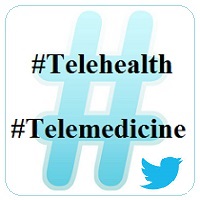 Stay up to date on the latest and join the conversation with #Telehealth and #Telemedicine.
Stay up to date on the latest and join the conversation with #Telehealth and #Telemedicine.
Technology use in our society is advancing day by day if not minute by minute and we can choose to either jump on board the train or watch from the sidelines at the station. The American Medical Association (@AmerMedicalAssn) recently sent a clear message that if you want to be a successful member of the medical profession now and in the future, you need to hop on board the technology train, more specifically the telemedicine train. At their Annual Meeting the AMA’s Council on Ethics and Judicial Affairs presented the new ethical guidance on telehealth and telemedicine that it has developed over the past three years and it was adopted by physicians from every corner of the country. The motivation for the new guidelines is the continuous innovation that is reshaping the ways in which people engage with medicine. AMA Board Member Jack Resneck, M.D. confirms this sentiment, “Telehealth and telemedicine are another stage in the ongoing evolution of new models for the delivery of care and patient-physician interactions.”
Global Telemedicine Market Outlook 2021
Market Reports Center (@reports_market) predicts that the global telemedicine market will expand at a CAGR of 14.77% during 2015-2021. The report takes into account factors like ageing world population, expansion of healthcare services in rural and remote areas, attending emergency medical incidents, and government initiatives to cut down on medical expenses to name a few. Market Reports Center is an e-commerce platform obliging the needs of knowledge workers, experts, professionals who are subject to market research information for their work, or to make strategic business decisions.
Telemedicine device wins Africa Prize for Engineering Innovation
Twenty-four year old, Arthur Zang – an engineer from Cameroon, was recently selected as the winner for the 2016 Africa Prize for Engineering Innovation reports Telehealth & Telecare Aware (@telecareaware). Zang’s invention, the Cardio Pad, allows health workers to give heart examinations and take a 12-sensor Electrocardiogram (ECG) and send the results to a heart specialist in a hospital via a mobile phone network. The Cardio Pads are given to hospitals free of charge and patients pay an annual subscription of $29.
Kaufman Hall Execs Will Show How to Develop a Competitive Virtual/Telehealth Strategy at HFMA ANI 2016
The Healthcare Financial Management Association’s Annual National Institute (#HFMA2016ANI) takes place June 26-29, in Las Vegas. Kaufman Hall (@KaufmanHall), a leading provider of strategic, capital and financial advisory services and software tools to healthcare organizations, recently announced that their Senior Vice Presidents will present an educational session “Developing a Virtual/Telehealth Strategy.” Kaufman Hall Senior Vice Presidents, Dan Clarin and Jason O’Riordan will explain why virtual care delivery offerings are critical to the success of healthcare organizations in today’s consumer-centric care environment. Additionally, the presenters will lay out a roadmap evaluating market conditions and competitors, and maximizing the opportunities for telehealth. [tweet_dis excerpt=”Don’t miss @KaufmanHall presentation at #HFMA2016ANI on #Telehealth Strategy”]Tweet This[/tweet_dis]
In State News
Insurers embrace telemedicine to offer convenient services, cost savings
Blue Cross Blue Shield of Michigan (@BCBSM) will extend telemedicine service for some 2 million members. Beginning July 1, the telemedicine product will be available through Boston-based American Well (@AmericanWell) to employers with fully insured and PPO policies. By making the move, Blue Cross Blue Shield seeks to reduce costly visits to a hospital emergency room or urgent care center for something that is readily treated in a lesser setting, while meeting the growing demands of consumers who want the ability to electronically connect with care providers at their convenience.
New York Legislation to Require Payment Parity for Telehealth Services
New York introduced a new bill designed to ensure commercial health plans pay for telehealth services at the same rate the plans pay for in-person services reports Foley Healthcare (@foleyhealthcare). The new bill seeks to add payment parity language to the State’s existing telehealth coverage statute. Payment parity is an important issue when drafting and considering proposed telehealth coverage bills. Because of the lack of payment parity language in the New York Statute, some commercial insurers decided they would pay providers only a fraction (some plans only 50%) of the reimbursement rate the provider would receive for identical in-person services.
CMS Covered Telehealth Services
You can download the list of services payable under the Medicare Physician Fee Schedule when furnished via telehealth on the CMS website.
